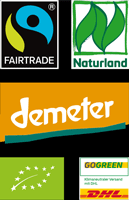- Commitment
Eco goes online.
I am going to be honest: I am an online shopper. Not necessarily at the “big smiling A”, but I order most of my clothes second-hand online. I order my spices online. And of course, I would order my coffee online. I also enjoy going to a farmers market or to an actual shop. But since I am always quite busy with my job, dog, family, and my hobbies I love saving some time by ordering online – with a bad conscious. But a new study by the Institute for Applied Ecology shows, that it is actually not even necessary to feel guilty about it, at least when it comes to organic food.

Babette Lichtenford
Can I do that?
Normally, one would not associate “organic” with the virtual, digital world. And when you look at some of the people who have been working in the organic industry for a long time you can tell how much they are struggling with the online business. At the same time, the analyses by the Institute for Applied Ecology shows, how much this “new” approach can actually promote the economical, ecological, and social sustainability.*
Let’s take a look at the effects.
From an economic point of view, a digital platform is an additional sales channel and an alternative to farm shops, famers markets, grocery stores. Especially smaller producers can reach more customers.
E-commerce offers more security in terms of planning, since only the goods that were actually ordered online, have to be delivered – quite different to the concept of a farmers market. Furthermore, the producers have the freedom to decide what they want to sell and to set the prices.
From an ecological point of view food fast is decreased (key word: planning security), and “funny looking” food can deliberately be sold (for example at imperfect food). Delivery routes are shortened. Since the products are not transported to the distributors warehouse, then to the point of sale, only to then be picked up be the delivery service. Especially platforms that use assembly points that allow customers to pick up their orders themselves, help to reduce the carbon footprint. Moreover, if fruit and vegetables are not wrapped individually, there are even more opportunities for savings.
Of course, there are also social effects: Producers and customers can speak directly with each other. Express wishes, impart know-how, talk with each other. And for some the access to healthy and sustainable food only becomes possible – because not everyone is living near an organic food shop (or a second-hand shop or an organic coffee shop). In short:
You can.
Or like Cara-Sophie, project leader at the Institute for Applied Ecology, puts it: Digital platforms can significantly contribute to sustainable lifestyles – However, only if the political framework allows it and when the platforms specifically direct their business model towards sustainability. ** (translated freely from German)
Sources:
**www.reset.org/wie-nachhaltig-ist-der-online-lebensmittelvertrieb-und-digitale-mobilitaetsplattformen-07082021/
*www.oeko.de/presse/archiv-pressemeldungen/presse-detailseite/2021/wie-nachhaltig-sind-digitale-plattformen-fuer-lebensmittel-und-mobilitaet



